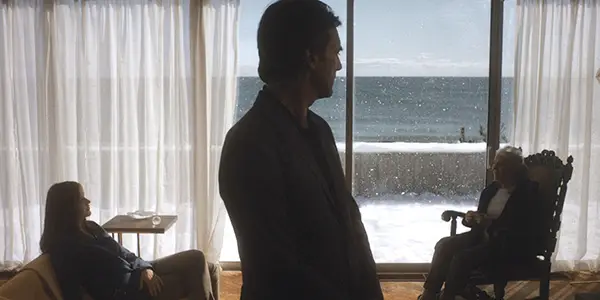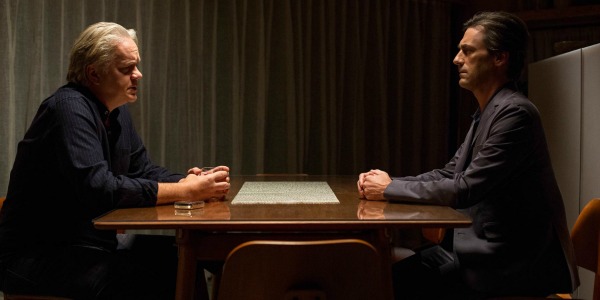MARJORIE PRIME: A Soulful Pondering Of Artificial Intelligence Applications

Alex Arabian is a freelance film journalist and filmmaker. His…
Every once in a while, a barely science-fiction, genre-bending gem will come along, subtly exploring far larger issues than its budget implies. Marjorie Prime is one of those films. A popular subject of early sci-fi films, virtual and augmented reality technology now exists in the world we live in, albeit in its early stages of development. Companies like Sony and Samsung, along with a slew of Silicon Valley startups, now sell successful VR and AR products; it’s an exploding industry. It’s also a troubling thought, when one examines our new reality through a philosophical lens.
Marjorie Prime was adapted from Jordan Harrison’s stage play by screenwriter and director Michael Almereyda (Experimenter, 2015, Hamlet, 2000, and the David Lynch-produced Nadja, 1995). As such, it makes maximum use out of minimal locations, but not to the detriment of the film; Almereyda is more-than adept at stage-to-screen adaptations. Marjorie Prime is a subtle, ethereal, and intelligent sci-fi dramedy that explores the potential uses of virtual reality and artificial intelligence in the near future.
In The Not-So-Distant-Future
In this story, Harrison and Almereyda focus on one application of VR, a marketable service that quite literally reanimates deceased loved ones as a service to grieving people, compiling each personality from an advanced AI system that gathers all digital information of the person to create an uncanny replica.
Walter Prime (Jon Hamm), the unusual protagonist, is a hologram of the deceased Walter Prime, used to help his aging widow, Marjorie (Lois Smith), recall fond memories of them together and help fill the void of his death 15 years prior. Eventually, however, the intent of this product backfires as “Walter” begins to interact with other members of Marjorie’s family. His presence stirs up old, unresolved issues with her daughter, Tess (Geena Davis), and son-in-law, Jon (Tim Robbins), causing them to question this technology and its effectiveness in providing comfort to the elderly.

Unknowingly, Tess and Jon need this reminder, this remnant of their deceased father (and father-in-law) to help them cope with and understand their life with him. They are an unhappy couple struggling to find fulfillment in their marriage. A scene during which the two find themselves caught in a rainstorm at the country club where Walter’s funeral was held serves as a fitting metaphor for the ruts in their relationship. Jon sits at a piano at the club, with The Band’s Bob Dylan-penned I Shall Be Released in mind, but he can’t remember how to play it. Jess finishes the haunting piano cover beautifully. The importance of human-to-human interaction in Marjorie Prime is exemplified through this quiet yet powerful scene.
Science and Soul – Blurred Lines
The pacing is painstakingly slow, but not to the detriment of the film. Its lengthy periods of silence are filled with a foreboding score and gorgeous visuals of nature. Cinematographer Sean Price Williams uses filler shots of the surrounding beach house where Marjorie, Tess, and Jon live through an opaque lens – a sometimes blurred filter, especially through flashbacks. This adds layers to the film’s most important motifs: the distortion of reality through memories and the intangibility of time.
Jon calls memory “the cemetery of the brain.” The older we get, the more our memories change; we only remember how we felt about them at the time, not the events surrounding the memories, and how we feel about certain events in our lives may change as we age.

These VR holograms are like caretakers and are capable of interaction, but they don’t understand simple language nuances, such as sarcasm. Almereyda and Harrison argue that a person cannot be replaced, no matter how much we try to replicate them. Over the next two decades, characters age, pass, and become “reincarnated,” no matter how much it may hurt more than heal those around them. Loss can leave a permanent hole in a human being’s mind. It can change them, reduce them to hapless, walking automatons, not too different than the VR holograms themselves.
Ethical Conversations, Applications Of AI
The main conversation Harrison and Almereyda open up is as follows: Just because humankind has the capability of creating something, doesn’t mean it should. Marjorie is too vulnerable and close to the issue to see anything wrong with having a holographed Walter around, so Tess and Jon act as the moral compasses of the film. They serve as vehicles for Harrison and Almereyda to instigate this ethical debate among their viewers.
Almereyda is no stranger to exploring moral cautionary tales given his innovative, modern-day update of Shakespeare’s Hamlet. However, he explored the convoluted lines of morality more closely with his last film, Experimenter. One can think of that biopic about social psychologist Stanley Milgram, and the radical methods he used in conducting his research about humankind’s willingness to obey authority, as a nonfiction companion piece to Marjorie Prime, thematically.

The lyrics to I Shall Be Released, the original song of which is finally played near the ending, hit very close to home within the story, underscoring the film’s necessary exploration into the future of medical advancement.
They say everything can be replaced
They say every distance is not near
So I remember every face
Of every man who put me here
I see my light come shinin’
From the west down to the east
Any day now, any day now
I shall be released
Perhaps letting go, naturally progressing through the grieving process, and appreciating the love you experienced in your life is enough for the human mind. Jon grows old, and disappears among the memories lingering around his lone beach-house. “How nice it is that we can love somebody,” a familiar voice from his past utters. For to have loved each other at all is the greatest gift these characters received from life. It’s a somber lesson that Jon learns in a rather harsh and unrelenting manner.
A Thoughtful, Dystopian Deliberation
Hamm plays the part of Walter Prime to perfection, with his soothing monotone voice and naive, inquisitive facial reactions. Both as an aging woman struggling with cognitive decline and as her semi-real counterpart, Lois Smith is a revelation. Through pictures covering Smith’s storied lifespan shown throughout the film, Almereyda gracefully pays his respects to the stage legend and character actress. Robbins and Davis play their roles with soul. Let us hope that Davis continues her return to the big screen with more weighty roles, because her presence has been sorely missed.
Marjorie Prime is a sobering look at the ethical questions surrounding scientific and medical advancements in regards to their possible human applications and subsequent repercussions. The world is making exponential progress in treating Alzheimer’s and other progressive, cognitive degenerative brain diseases, similar to what Marjorie suffers from in the film. With nuance and an introspective eye, Almereyda conjures up an extreme scenario for treatment in a dystopian future where a cure for an ailing mind isn’t possible, creating a beautifully bleak, hypnagogic world in Marjorie Prime that allows its pensive themes to flourish.
Are you a fan of dystopian science-fiction? Are you looking forward to Marjorie Prime? Do you think AI and AR can do more potential harm or good?
Marjorie Prime is distributed by FilmRise, and will be released August 18, 2017.
Does content like this matter to you?
Become a Member and support film journalism. Unlock access to all of Film Inquiry`s great articles. Join a community of like-minded readers who are passionate about cinema - get access to our private members Network, give back to independent filmmakers, and more.
Alex Arabian is a freelance film journalist and filmmaker. His work has been featured in the San Francisco Examiner, The Playlist, Awards Circuit, and Pop Matters. His favorite film is Edward Scissorhands. Check out more of his work on makingacinephile.com!












